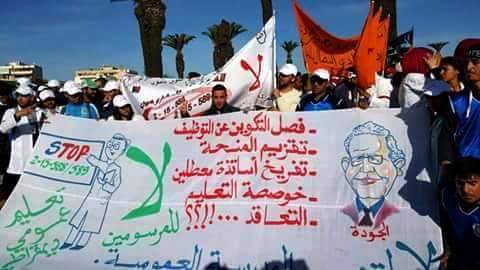
Jan 27, 2016
Thousands of teacher trainees, holding banners reading “Marching for dignity and justice,” and chanting “We’re prepared to go to prison,” marched through the streets of Morocco’s capital, Rabat, this week to denounce two government decrees to cut scholarships and jobs.

Teacher trainees defied government threats barring them from public protest. Credit: Hicham Ahmadouch/UMT
The protest followed a meeting between representatives of the teacher trainees and the government, which refused to annul the two decrees but agreed to recruit an additional 3,000 teacher trainers not covered by the 2016 fiscal year budget.
The workers, who have been on strike for two months, took to the streets despite government threats against unauthorized marches. At a rally earlier this month, several teacher trainees were beaten by police. Primarily in the their 20s and 30s, teacher trainees say the government’s decrees will further fuel the country’s already high youth unemployment rate, which, at more than 20 percent, is double the nation’s overall unemployment rate.
Morocco’s head of government, Abdelilah Benkirane, asserted that he will not “repeal the government decrees,” regarding teacher trainees.
Earlier this month, some 4,000 workers staged a sit-in outside the parliament in Rabat to protest worker cutbacks in pensions and ongoing worker rights violations, including the attacks on the teacher trainees.
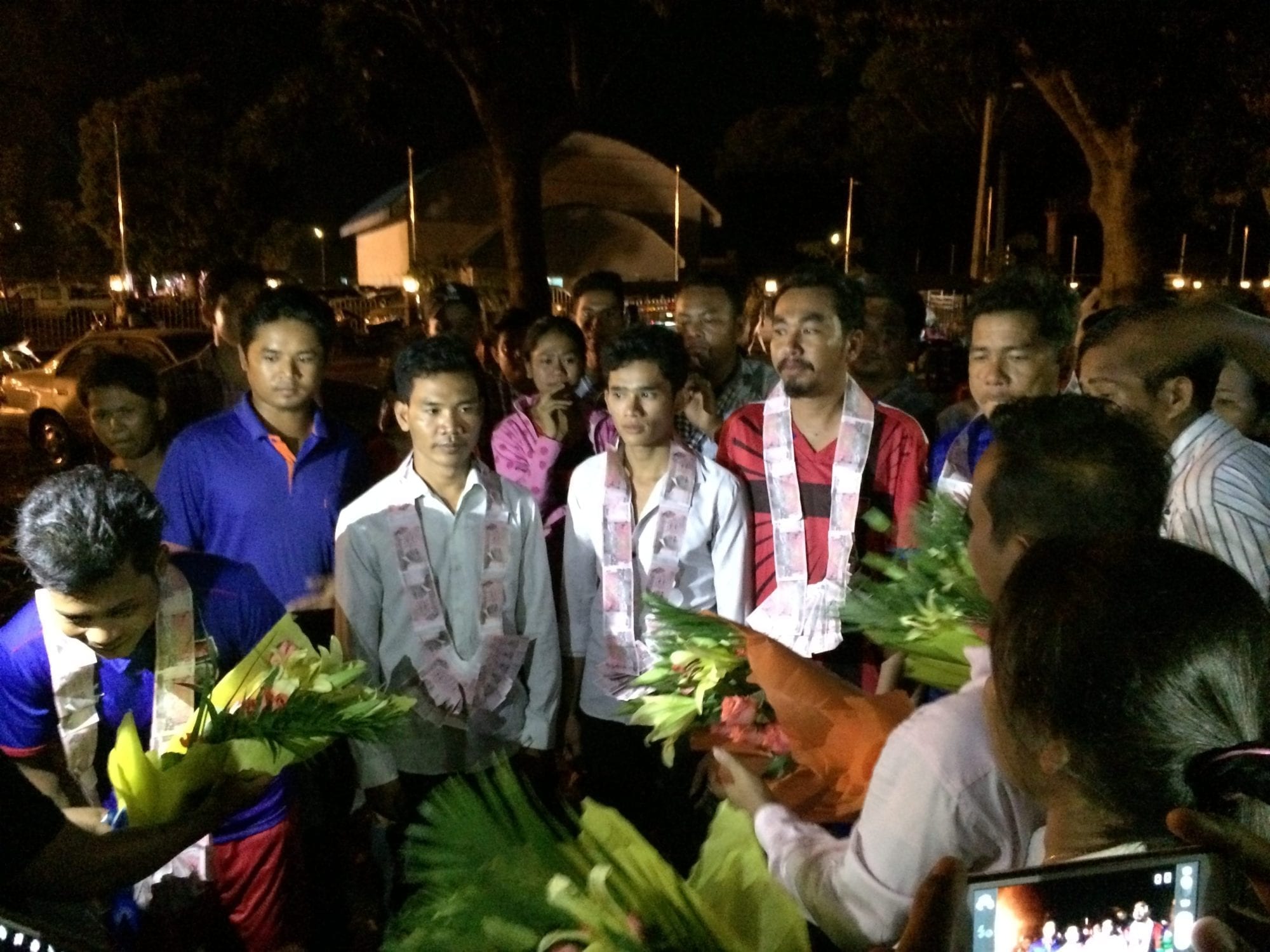
Jan 19, 2016
Five leaders of the Collective Union of Movement of Workers (CUMW) in Cambodia were released from detention today after spending nearly a week in prison for seeking to assist striking garment factory workers who sought their support. The Solidarity Center legal team in Phnom Penh was instrumental in securing the five men’s freedom.
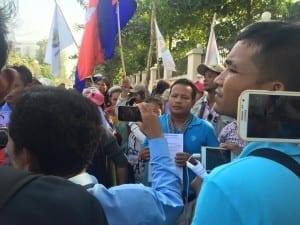
CUMW President Pav Sina said without support from the Solidarity Center, the union would have been unable to secure justice for the five organizers. Credit: Solidarity Center
Speaking at a gathering this evening to mark the release of the five union leaders, CUMW President Pav Sina said without support from the Solidarity Center, the union would have been unable to secure justice for the five organizers.
The organizers say they were beaten and arrested on January 12 when they sought to meet with the workers at the factory. Five other workers were beaten, with four suffering serious injuries to their eyes, heads and hands. The workers, who make sweaters, had sought the union’s assistance in helping them achieve workplace improvements that include lengthening work contracts from three months to a year; doubling daily pay for holiday work; and providing additional piece work pay.
At a rally in early January, the five CUMW leaders joined workers outside the factory in a solidarity rally which was disrupted when the president of the employer-controlled union ordered his group of workers to destroy CUMW materials and loud speakers. Several days later, more than 400 workers protested outside buildings housing the Prime Minister and National Assembly to further press for their rights at work and the next day, more than 500 workers gathered at the factory and at the court to demand release of the union organizers.
Short-term Contracts Make It Hard for Workers to Win Better Wages
Cambodia’s garment workers “often experience discriminatory and exploitative labor conditions” according to a Human Rights Watch report last year, which cited short-term contracts as contributing to the often abusive conditions.
“The combination of short-term contracts that make it easier to fire and control workers, poor government labor inspection and enforcement, and aggressive tactics against independent unions make it difficult for workers, the vast majority of whom are young women, to assert their rights,” the report stated.
An estimated 700,000 workers in Cambodia sew and package more than $5 billion worth of clothing, textiles and shoes every year, making up at least one-third of the country’s gross domestic product. Yet workers currently earn far less than they need to cover expenses, according to a study of garment workers and their expenditures, conducted by labor rights groups, including the Solidarity Center.
Garment workers across Cambodia have waged a series of rallies and strikes to protest low wages, most recently in October, when some 21,000 garment workers from six unions at more than 60 factories rallied for a higher minimum wage. In 2014, tens of thousands of garment workers took part in a series of mass protests demanding a living wage. At one rally, Cambodian security forces killed five workers and injured more than 60 and resulting in the arrests and dismissals of dozens of workers and union leaders.
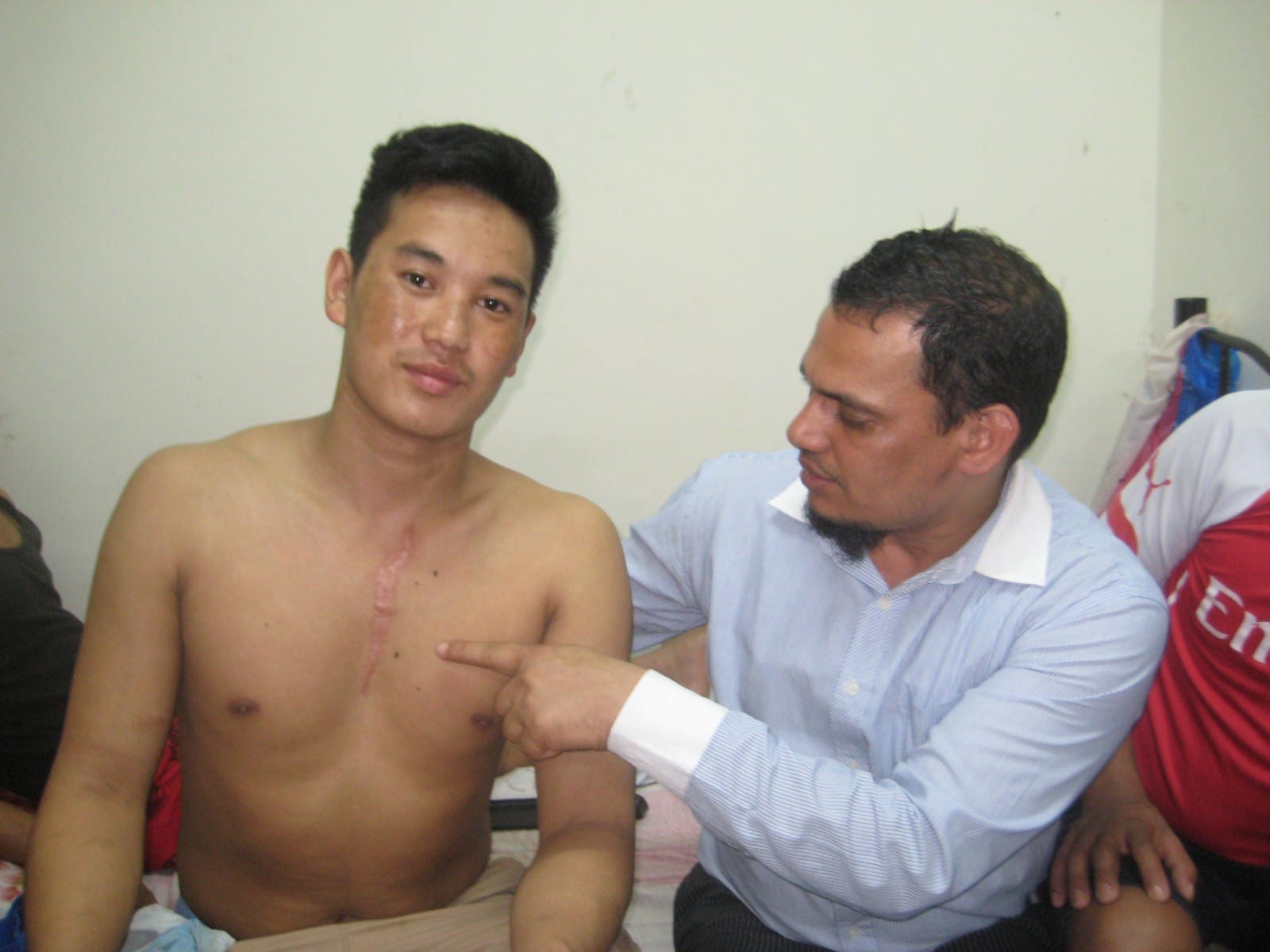
Jan 19, 2016
Migrant workers at a glass factory in Malaysia say that for the past year, they have been forced to work 16-hour days, Monday through Friday, and eight-hour days on Saturdays and Sundays—without a day off. Injuries are common, such as the deep, seven-inch long gash one worker suffered on his chest while carrying glass.
Their report is the latest in a litany of continuing violations of migrant worker rights compiled by the Malaysian Trades Union Confederation (MTUC) and the General Federation of Nepalese Trade Unions (GEFONT), both Solidarity Center allies.
Over the past year, MTUC and GEFONT have documented hundreds of cases of employer abuse of migrant workers in Malaysia, often rising to the level of forced labor. Many of these workers, from China, India, Nepal, Sri Lanka and elsewhere, say their employer had not paid them, or had given them wages far below what they had been promised before leaving home. Female workers report being sexually assaulted by their employers.
Some 400 workers from Nepal died last year in Malaysia, according to Nepal’s labor attaché, who spoke before nearly 200 workers taking part at an MTUC-sponsored International Migrants Day event last month.
Migrant workers also suffer slave-like conditions on Malaysia’s palm oil plantations, according to a Wall Street Journal report last year.
Despite a slowing economy, employers in Malaysia are recruiting more migrant workers because they are paid less and do not receive social protection benefits, says N. Gopal Kishnam, MTUC general-secretary.
“Companies like to bring in foreign workers because they are easier to manage compared with locals. They also work hard and complain less,” Gopal told the Malaysian Insider.
A Malaysian employers’ group estimates that 20,000 workers were laid off last year, excluding 6,000 Malaysian Airlines workers who were let go as part of that company’s restructuring plan. Gopal said the figure is likely to be twice as high.
In July, the U.S. State Department upgraded Malaysia in its annual Trafficking in Persons Report, citing the country’s “significant efforts” to eliminate human trafficking.
“Many employers are still wrongly holding on to passports and work passes/visas/permits,” the MTUC said last year. “When workers claim their rights through existing legal avenues, many employers simply terminate their workers, and for migrant workers this also mean the loss of ability to stay in Malaysia which is a requirement in law if they want to pursue their claims for justice.”
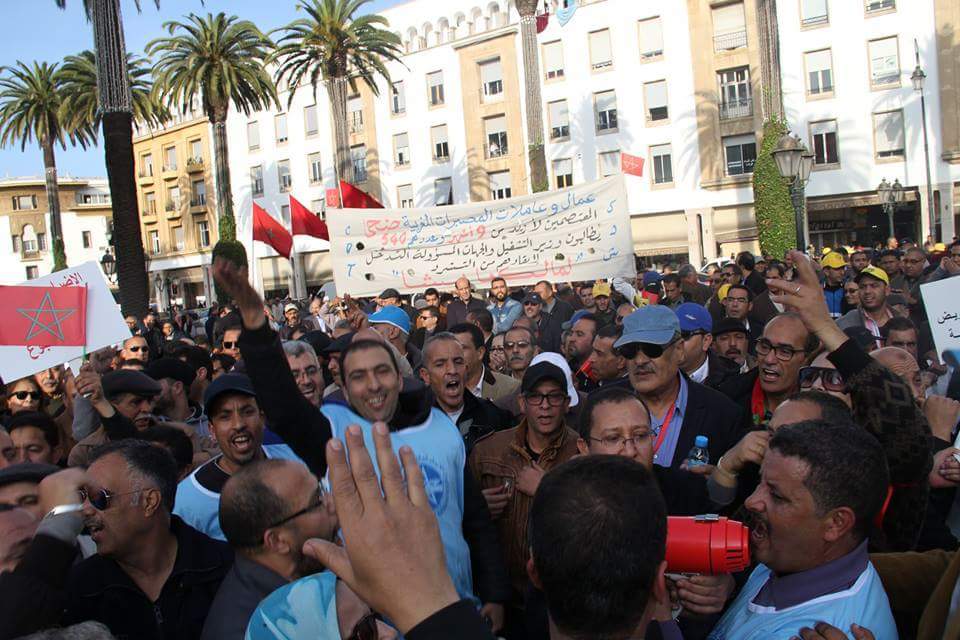
Jan 14, 2016
About four thousand workers staged a sit-in outside parliament in Rabat yesterday in a show of popular protest against socioeconomic policies that are economically harmful to working people, among them planned pension reforms, a freeze on talks with civil society groups and ongoing violations of worker rights–including the government’s refusal to negotiate with trade unions on wages and working conditions for public service workers.
Protesters expressed solidarity with student teachers beaten by police last week while peacefully marching against the decision to reduce their stipends and block their path to teaching jobs.
The sit-in is a follow-up to last month’s nationwide strike by national and local public-sector workers, organized by the four largest trade union confederations in Morocco.
Miloudi Moukharek, general secretary of the Union Marocaine du Travail (Moroccan Labor Union, UMT), said all four federations are united against the government’s unpopular policies and its unwillingness to engage in dialogue with workers on wages and other issues.
Images and video footage of police attacks on young protesters around the country on Thursday last week went viral on social media, inspiring condemnation from local and international sources.
The sit-in was organized by the Confédération Démocratique du Travail (Democratic Labor Confederation, CDT), the Federation Démocratique du Maroc (Democratic Federation of Labor, FDT), the Union Générale des Travailleurs du Maroc (General Union of Moroccan Workers, UGTM) and UMT. Solidarity Center partners with the CDT and the UMT.
Jan 13, 2016
At least four garment workers lost their lives yesterday and dozens more were injured when the two flat-bed trucks they were commuting to work on collided, according to Solidarity Center staff at the site of the incident. One of the trucks was carrying 50 people and the other more than 70 workers. The deaths left at least eight children without their mother.
Agence France-Presse reports that 13 of the injured workers are in critical condition.
The incident happened as the Solidarity Center’s legal team was in court overseeing disbursement of the settlement to victims and surviving families of a bus crash that killed 19 workers and injured another 20 people last spring. Families of the deceased and workers injured in the May 2015 incident attended the court session, where they received meager payments of between $1,500 and $3,000 for the loss of their loved ones or their pain and suffering. After almost a year, a number of workers who survived say they have not received compensation due them from the National Social Security Fund (NSSF).
Cambodia’s garment sector features notoriously dangerous and largely unregulated transportation for its workers, who crowd onto open-air trucks to save money. According to Women’s Wear Daily, “73 garment workers died from traffic accidents while going to work, while 789 were injured” in 2014. Meanwhile, more than 7,000 garment workers were injured and 130 killed while they were being transported to and from factories in 2015, according to the National Social Security Fund (NSSF).
“The extremely high number of fatalities and injuries is completely unacceptable,” said William Conklin, Solidarity Center Cambodia program director. “Garment workers, or any other workers, should not have to fear for their life each day on the commute to and from work. Yet they do because of the confluence of low wages and high disregard for the lives of workers on the part of authorities and factory owners. Labor here is just a commodity.”
Cambodian unions say wages are vital to safe transport for Cambodian workers, and freedom of association is crucial to collective bargaining for higher wages. Just a short distance from the site of Tuesday’s crash, workers at a sweater factory continued their strike demanding, among other things, a $3 increase in the monthly transport allowance. The response from the factory and the authorities was a violent crackdown on striking workers, arresting five and injuring about 30 people, two of them seriously.






